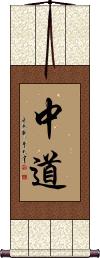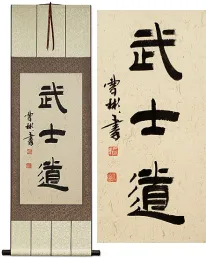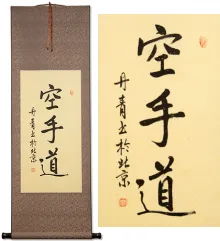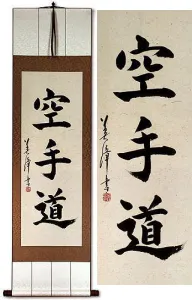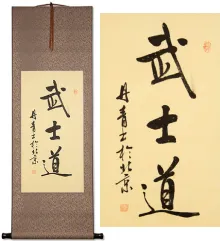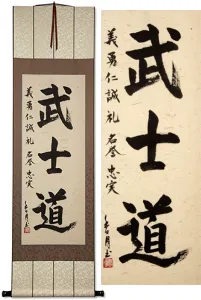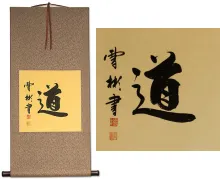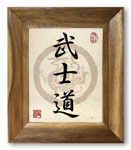Many custom options...
And formats...

The Middle Way in Chinese / Japanese...
Buy a The Middle Way calligraphy wall scroll here!
The Middle Way
In the most basic translation, 中道 means road through the middle or middle road.
The expanded meaning can be moderation or the golden mean.
But if you are looking for this title, you are probably seeking the Buddhist definition, which is more complex.
中道 is the middle way or middle path of Buddhism. This has various interpretations. In general, it denotes the mean between two extremes and has special reference to the mean between realism and nihilism, or eternal substantial existence and annihilation.
The Buddha teaches that one should not take things to extremes. Don't be extremely evil and engage in debauchery and murder. But do not spend every waking out trying to be a perfect saint. Instead, take the middle path, try to help others, show loving kindness wherever you can, and try not to do harm. If you inadvertently harm another being, make amends if you can, and move on. Realize you are not perfect, but in time, a path of moderation lead toward proper living and enlightenment.
This in-stock artwork might be what you are looking for, and ships right away...
Gallery Price: $200.00
Your Price: $98.88
Gallery Price: $200.00
Your Price: $118.88
Gallery Price: $268.00
Your Price: $148.77
Gallery Price: $87.00
Your Price: $47.88
Gallery Price: $200.00
Your Price: $118.88
Gallery Price: $200.00
Your Price: $118.88
Gallery Price: $200.00
Your Price: $118.88
Not the results for the middle way that you were looking for?
Below are some entries from our dictionary that may match your the middle way search...
| Characters If shown, 2nd row is Simp. Chinese |
Pronunciation Romanization |
Simple Dictionary Definition |
中道 see styles |
zhōng dào zhong1 dao4 chung tao nakamichi なかみち |
More info & calligraphy: The Middle WayThe 'mean' has various interpretations. In general it denotes the mean between two extremes, and has special reference to the mean between realism and nihilism, or eternal substantial existence and annihilation; this 'mean' is found in a third principle between the two, suggesting the idea of a realm of mind or spirit beyond the terminology of 有 or 無, substance or nothing, or, that which has form, and is therefore measurable and ponderable, and its opposite of total non-existence. See 中論. The following four Schools define the term according to their several scriptures: the 法相 School describes it as the 唯識, v. 唯識中道; the 三論 School as the 八不 eight negations, v. 三論; the Tiantai as 實相 the true reality; and the Huayan as the 法界 dharmadhātu. Four forms of the Mean are given by the 三論玄義. |
一中 see styles |
yī zhōng yi1 zhong1 i chung icchuu / icchu いっちゅう |
(given name) Icchuu A hall of spread tables; idem一普. |
三相 see styles |
sān xiàng san1 xiang4 san hsiang sansou / sanso さんそう |
(noun - becomes adjective with の) three phases The three forms or positions: 解脫相 nirvāṇa; 離相 no nirvāṇa; 滅和 or 非有非無之中道 absence of both, or the "middle way" of neither. |
中々 see styles |
nakanaka なかなか |
(adv,adj-na) (1) (kana only) very; considerably; easily; readily; fairly; quite; highly; rather; (adverb) (2) (kana only) by no means (with negative verb); not readily; (3) middle; half-way point; (can be adjective with の) (4) (kana only) excellent; wonderful; very good |
中中 see styles |
zhōng zhōng zhong1 zhong1 chung chung chūchū なかなか |
middling; average; impartial; (Hong Kong) secondary school that uses Chinese as the medium of instruction ("CMI school") (adv,adj-na) (1) (kana only) very; considerably; easily; readily; fairly; quite; highly; rather; (adverb) (2) (kana only) by no means (with negative verb); not readily; (3) middle; half-way point; (can be adjective with の) (4) (kana only) excellent; wonderful; very good middling of the middling |
中實 中实 see styles |
zhōng shí zhong1 shi2 chung shih chūjitsu |
idem 中道實相. |
中庸 see styles |
zhōng yōng zhong1 yong1 chung yung nakatsune なかつね |
golden mean (Confucianism); (literary) (of person) mediocre; ordinary (n,adj-no,adj-na) (1) middle way; (golden) mean; moderation; middle path; (2) (See 四書) the Doctrine of the Mean (one of the Four Books); (personal name) Nakatsune Doctrine of the Mean |
中段 see styles |
zhōng duàn zhong1 duan4 chung tuan nakadan なかだん |
middle section; middle period; middle area; mid- half-way up a slope or stairway; landing; center of three (horizontal) columns (of print) (centre); (place-name, surname) Nakadan |
中觀 中观 see styles |
zhōng guān zhong1 guan1 chung kuan chū gan |
Meditation on the Mean, one of the 三觀; also meditation on the absolute which unites all opposites. There are various forms of such meditation, that of the 法相宗, the 三論宗, the 天台宗. v. 中論. |
中論 中论 see styles |
zhōng lùn zhong1 lun4 chung lun Chūron |
中觀論 Prāñnyāya-mūla-śāstra-ṭīkā, or Prāṇyamula-śāstra-ṭīkā; the Mādhyamika-śāstra, attributed to the bodhisattvas Nāgārjuna as creator, and Nīlacakṣus as compiler; tr. by Kumārajīva A. D. 409. It is the principal work of the Mādhyamika, or Middle School, attributed to Nāgārjuna. Versions only exist in Chinese and Tibetan; an English translation by Miyamoto exists and publication is promised; a German version is by Walleser. The 中論 is the first and most?? important of the 三論 q. v. The teaching of this School is found additionally in the 順中論; 般若燈論釋大乘中觀釋論 and 中論疏. Cf. 中道. The doctrine opposes the rigid categories of existence and non-existence 假 and 空, and denies the two extremes of production (or creation) and nonproduction and other antitheses, in the interests of a middle or superior way. |
五觀 五观 see styles |
wǔ guān wu3 guan1 wu kuan gokan |
The five meditations referred to in the Lotus Sutra 25: (1) 眞 on the true, idem 空觀, to meditate on the reality of the void or infinite, in order to be rid of illusion in views and thoughts; (2) 淸淨觀 on purity, to be rid of any remains of impurity connected with the temporal, idem 假觀; (3) 廣大智慧觀 on the wider and greater wisdom, idem 中觀, by study of the 'middle' way; (4) 悲觀 on pitifulness, or the pitiable condition of the living, and by the above three to meditate on their salvation; (5) 慈觀 on mercy and the extension of the first three meditations to the carrying of joy to all the living. |
仲々 see styles |
nakanaka なかなか |
(irregular kanji usage) (adv,adj-na) (1) (kana only) very; considerably; easily; readily; fairly; quite; highly; rather; (adverb) (2) (kana only) by no means (with negative verb); not readily; (3) middle; half-way point; (can be adjective with の) (4) (kana only) excellent; wonderful; very good |
六慧 see styles |
liù huì liu4 hui4 liu hui rokue |
The six kinds of wisdom. Each is allotted seriatim to one of the six positions 六位 q. v. (1) 聞慧 the wisdom of hearing and apprehending the truth of the middle way is associated with the 十住; (2) 思慧 of thought with the 十行; (3) 修慧 of observance with the 十廻向; (4) 無相慧 of either extreme, or the mean, with the 十地; (5) 照寂慧 of understanding of nirvana with 等覺慧; (6) 寂照慧 of making nirvana illuminate all beings associated with 佛果 Buddha-fruition. They are a 別教 Differentiated School series and all are associated with 中道 the school of the 中 or middle way. |
四依 see styles |
sì yī si4 yi1 ssu i shi e |
The four necessaries, or things on which the religious rely. (1) 行四依 The four of ascetic practitioners— rag clothing; begging for food; sitting under trees; purgatives and diuretics as moral and spiritual means; these are also termed 四聖種. (2) 法四依 The four of the dharma: i. e. the truth, which is eternal, rather than man, even its propagator; the sutras of perfect meaning i. e. of the 道實相 the truth of the 'middle' way; the meaning, or spirit, not the letter; wisdom 智, i.e. Buddha-wisdom rather than mere knowledge 識. There are other groups. Cf. 四事. |
圓妙 圆妙 see styles |
yuán miào yuan2 miao4 yüan miao enmyō |
The mystery of the 'perfect' school, i.e. the complete harmony of 空假中 noumenon, phenomenon, and the middle way. |
圓悟 圆悟 see styles |
yuán wù yuan2 wu4 yüan wu engo えんご |
(personal name) Engo Completely to apprehend the truth. In Tiantai, the complete apprehension at the same time of noumenon, phenomenon, and the middle way. |
當道 当道 see styles |
dāng dào dang1 dao4 tang tao |
in the middle of the road; to be in the way; to hold power; (fig.) to predominate; to be in vogue See: 当道 |
途上 see styles |
tojou / tojo とじょう |
(n,adv) (1) on the way; en route; (2) in the process of (development, construction, etc.); in the middle of; (given name) Tojō |
途中 see styles |
tú zhōng tu2 zhong1 t`u chung tu chung michinaka みちなか |
en route (n,adv) (1) on the way; en route; (n,adv) (2) in the middle of; midway; halfway; (surname) Michinaka |
道中 see styles |
dào zhōng dao4 zhong1 tao chung michinaka みちなか |
(1) middle of the road; on the road; (2) on the way (to one's destination); (surname, given name) Michinaka in the middle of the road |
まん中 see styles |
mannaka まんなか |
middle; centre; center; mid-way |
不分別 不分别 see styles |
bù fēn bié bu4 fen1 bie2 pu fen pieh fu funbetsu |
The indivisible, or middle way 中道. |
中道宗 see styles |
zhōng dào zōng zhong1 dao4 zong1 chung tao tsung Chūdō Shū |
The third period of the Buddha's teaching, according to the 法相宗, giving the via media between the two extremes, the absolute as not confined to the phenomenal or the noumenal; also called 中道教. |
中道教 see styles |
zhōng dào jiào zhong1 dao4 jiao4 chung tao chiao chūdō kyō |
teaching of the middle way |
中道義 中道义 see styles |
zhōng dào yì zhong1 dao4 yi4 chung tao i chūdō gi |
meaning of middle way |
中道觀 中道观 see styles |
zhōng dào guān zhong1 dao4 guan1 chung tao kuan chūdō kan |
One of the Tiantai 三觀 three meditations, i. e. on the doctrine of the Mean to get rid of the illusion of phenomena. |
五種性 五种性 see styles |
wǔ zhǒng xìng wu3 zhong3 xing4 wu chung hsing goshu shō |
The five germ-natures, or roots of bodhisattva development: (1) 習種性 the germ nature of study of the 空 void (or immaterial), which corrects all illusions of time and space; it corresponds to the 十住 stage; (2) 性種性 that of ability to discriminate all the 性 natures of phenomena and transform the living; the 十行 stage; (3) 道種性(the middle-) way germ-nature, which attains insight into Buddha-laws; the 十廻向; (4) 聖種性 the saint germ-nature which produces holiness by destroying ignorance; the 十廻向 which the bodhisattva leaves the ranks of the 賢 and becomes 聖; (5) 等覺種性 the bodhi-rank germ-nature which produces Buddhahood, i. e. 等覺. |
契中道 see styles |
qì zhōng dào qi4 zhong1 dao4 ch`i chung tao chi chung tao kai chūdō |
to match with the middle way |
末陀摩 see styles |
mò tuó mó mo4 tuo2 mo2 mo t`o mo mo to mo madama |
This is intp. as not. in the mean or middle way. |
狐の窓 see styles |
kitsunenomado きつねのまど |
way of entangling one's hands together to leave a small opening between the middle and ring fingers; fox's window |
Click here for more the middle way results from our dictionary
The following table may be helpful for those studying Chinese or Japanese...
| Title | Characters | Romaji (Romanized Japanese) | Various forms of Romanized Chinese | |
| The Middle Way | 中道 | chuu dou / chuudou / chu do | zhōng dào zhong1 dao4 zhong dao zhongdao | chung tao chungtao |
Successful Chinese Character and Japanese Kanji calligraphy searches within the last few hours...
